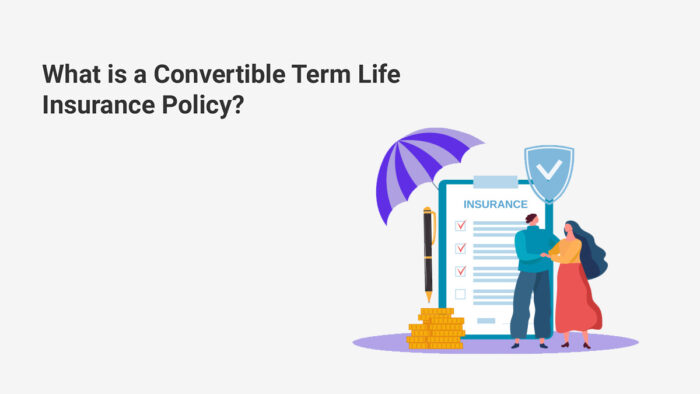A convertible term life insurance policy is a type of life insurance policy that offers a unique feature: the option to convert the term life insurance coverage into a permanent life insurance policy without having to undergo a medical examination.

This type of policy provides a fixed death benefit for a specific period, typically 10 to 30 years, depending on the chosen term length. During this initial term, your premiums remain level, and the policy functions like any other term life insurance policy, providing coverage only if you pass away during the specified term.
How Does it Work?
A convertible life insurance policy allows you to purchase less expensive term coverage now while also having the option of converting it to a permanent policy with the same death benefit tomorrow. This can be an advantageous option if your insurance requirements, financial resources, or medical circumstances change in the future.
A convertible policy allows you to avoid any medical underwriting difficulties. You are not required to undergo any new or extra screenings when the policy is converted, regardless of your medical status.
When you convert, the insurer cannot raise the premium depending on your health status. Even if you develop health problems later, your health rating remains the same as when you first signed up for coverage.
However, the cost of permanent coverage will be determined by your age at the time of conversion. It will cost more than if you had purchased the permanent life insurance policy from the start, rather than buying term and converting later.
Can You Switch From Term to Whole Life Insurance?
It depends. Some term life insurance policies are convertible; others are not. If your term life policy has a term conversion rider, you will be able to convert some or all of it to a whole life insurance policy. You may consider changing term life insurance to whole life insurance for a variety of reasons, such as a change in your health, the need to continue paying for dependents, or unexpected debt.
When to Convert Term Life Insurance
You must decide whether to convert your term policy to whole life insurance before the original policy ends. It’s preferable to make the adjustment when you understand your circumstances are about to change or you’ll need coverage for longer than you expected. As soon as you decide to convert your life insurance, you should contact your insurance provider.
Frequently Asked Questions
How many times can a convertible term life insurance policy be converted?
Within the first five years, you can upgrade to the widely popular Advantage Choice, which provides coverage for life. However, your conversion options are restricted to two pricey permanent policies that begin five years after the original policy’s start date.
What is the difference between whole life and convertible term?
Whole life insurance is everlasting; it provides you with lifelong protection as long as you pay your premium on time, and your premium remains constant for the duration of your policy. Convertible life insurance allows you to convert your term coverage to permanent coverage.
Can you cash out a convertible term life insurance policy?
In general, you can cash out life insurance if the policy has acquired cash value. This could be a permanent or convertible term life insurance policy. But the concept remains the same: there must be some financial value in the policy before you may withdraw it.
Can you borrow from a convertible term life insurance policy?
If you have a term policy, you cannot borrow against it. However, you should consider converting your policy to whole life insurance so that you can take advantage of this option in the future. Look up the current cash value. Find out what your policy is now worth.
What is the main benefit of a convertible term assurance?
A convertible life insurance policy allows you to purchase less expensive term coverage now while also having the option of converting it to a permanent policy with the same death benefit tomorrow. 1 This can be a helpful choice if your insurance requirements, financial resources, or medical circumstances change in the future.
Which is better, term or whole life insurance?
Term life insurance is less expensive but only provides coverage for a specified period of time. Whole life insurance, on the other hand, has higher premiums but no expiration date. Understanding the distinctions between term and whole life insurance will assist you in selecting a policy that best fits your needs and lifestyle.



